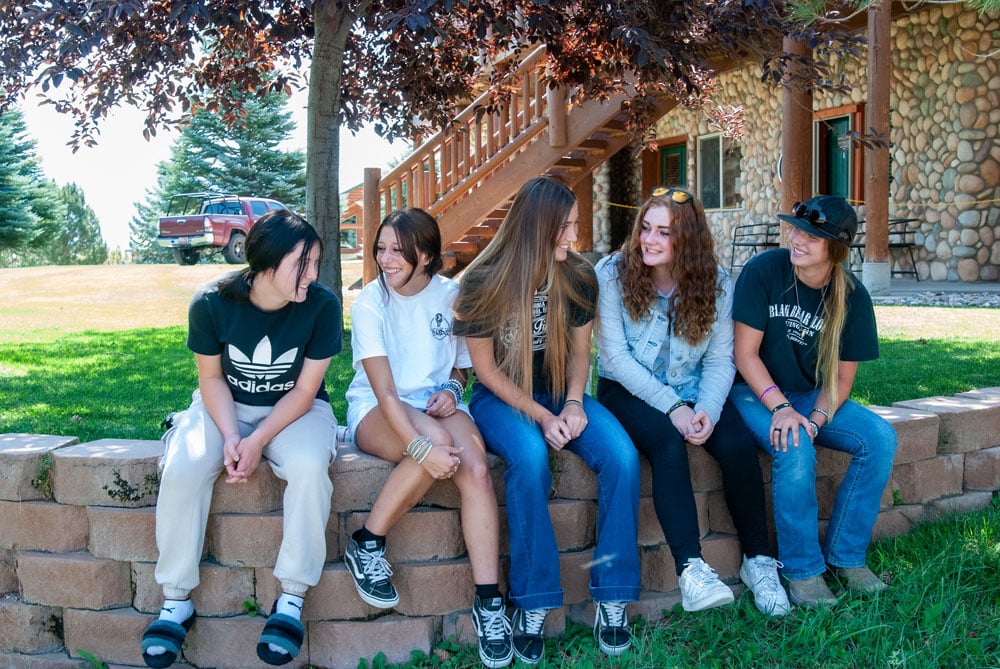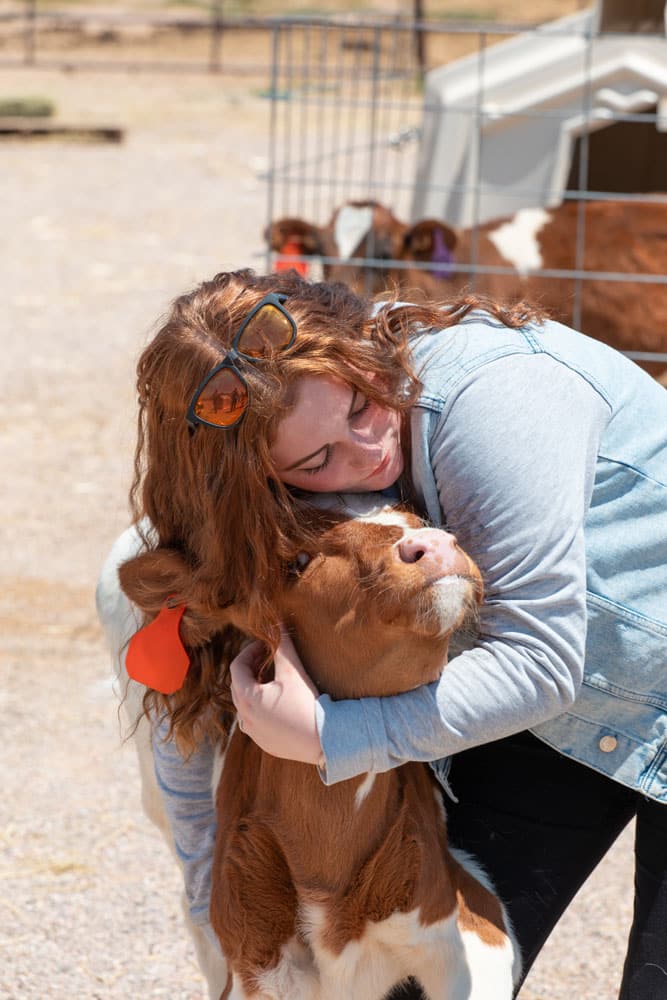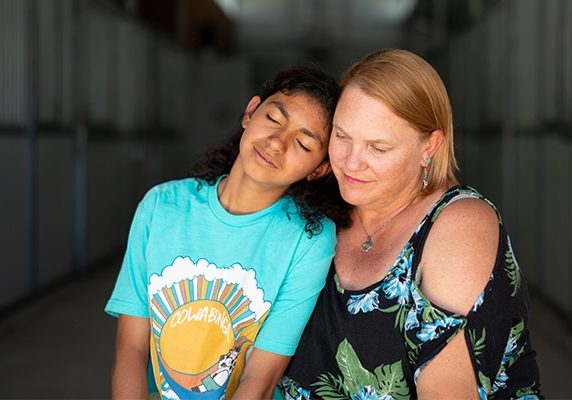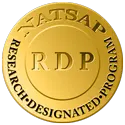By taking this important step towards specialized teen autism treatment, you’re opening the door to numerous benefits that can profoundly impact your daughter's life. Our program is designed to support and empower her with skills and insights to help her thrive throughout her life.
- Understanding Autism in Teenage Girls: This article explains how autism in girls often presents differently than in boys, making it harder to diagnose. Parents will learn how social pressures and the ability to mask symptoms can lead to delayed or missed diagnoses in girls.
- The Importance of Tailored Support: Parents will learn the need for specialized treatment programs that cater to the unique needs of autistic girls, particularly in areas of social interaction and emotional regulation. The article emphasizes how tailored therapies can help their daughters build crucial life skills and improve their overall well-being.
- Recognizing the Signs of Autism in Teenage Girls: The document provides insight into specific behaviors and traits that may indicate autism in teenage girls, such as struggles with social cues, intense focus on specific interests, and difficulties with change. Understanding these signs can empower parents to seek the right support for their daughter.
At Discovery Ranch South, teen girls with autism spectrum disorder receive comprehensive, specialized care tailored to their unique individual needs. Girls receive structured support for developing executive functioning skills, helping them navigate daily responsibilities, schoolwork, and social interactions more effectively. Through targeted interventions, they learn strategies to improve organization, adaptability, and problem-solving—key skills for success in both school and life. Discovery Ranch South provides a nurturing environment where your daughter can develop essential life skills, build meaningful relationships, and achieve greater independence. With a blend of therapeutic, academic, and experiential learning, the teen autism treatment program at Discovery Ranch South empowers autistic teen girls to navigate the complexities of adolescence and emerge stronger, more confident, and ready for the future.
Highlights of Discovery Ranch South:
- Personalized Autism Treatment: We recognize that each girl who comes to our program is special and has unique needs. Discovery Ranch South’s programs address the specific challenges and strengths of autism in teenage girls.
- Social Thinking Framework: A key part of our approach includes the Social Thinking framework, which helps girls understand the thought processes behind social interactions. This evidence-based strategy empowers them to interpret social cues, improve communication, and build stronger relationships.
- Holistic Care Approach: Each girl is treated holistically and is offered clinical, residential, academic, experiential, nutrition, and healthy lifestyle care. Various unique therapies and therapeutic activities are offered to meet these needs.
- Expert Staff: Discovery Ranch South has a compassionate team of experienced and highly qualified therapists, educators, and residential staff with specialized training in teen autism treatment.
- Team Approach: Our team approach ensures that therapists, residential staff, academic instructors, and experiential therapists work together to provide holistic support. By collaborating across disciplines, we create a consistent and structured environment that helps girls apply new skills in real-life situations, from the classroom to social settings and beyond.
- Structured, Safe Environment: Our teen autism treatment program, provides a supportive setting where your daughter can thrive, build confidence, and develop essential life skills.
- Focus on Long-Term Success: Your daughter will learn life skills and make changes to prepare her not just for the present, but equipping her with the tools needed for a successful transition into adulthood.

Discovery Ranch South’s Neurodivergent Cabin provides a structured, understanding environment specifically designed for autistic teen girls. Here, students receive the support they need to thrive, without the pressure to conform to neurotypical expectations.
Staff members receive specialized training in neurodiversity and use concept-driven learning, social modeling, and real-time feedback to help students navigate social interactions. The goal is not to isolate but to create a space where girls feel understood, supported, and empowered to develop essential life skills at their own pace.
By removing unnecessary stressors and focusing on strengths, the Neurodivergent Cabin helps autistic girls build self-awareness, confidence, and resilience, equipping them to navigate the world on their own terms.
Contact Discovery Academy today to learn how our specialized autism treatment program can guide your teen toward a brighter, more fulfilling future.
Explore our table of contents to discover how your daughter can get the support that she needs through our unique approach that addresses autism in teenage girls.
Recognizing and Managing Autism in Teenage Girls
Recognizing autism in teenage girls can be challenging. Unlike boys, girls often mask their symptoms, making identifying them difficult. Early signs may include trouble with social interactions, unusual communication, or heightened sensory sensitivities. Parents should be aware of these potential indicators and seek professional help if concerned. Early diagnosis and intervention support a girl's development and well-being during this challenging life stage.
The teenage years present unique challenges for any teen. Middle school and high school can be particularly difficult as they navigate increased social pressures, friendships, and conflict resolution. New symptoms of autism may emerge during this time of life, emphasizing the importance of ongoing support and understanding. By recognizing autism in teenage girls, parents, and caregivers can provide the necessary tools and resources to help them thrive.

Addressing Co-Occurring Challenges
Autism often coexists with anxiety, depression, ADHD, or trauma, making it essential to take a comprehensive approach to treatment. Many autistic teens experience heightened stress due to sensory overload, difficulty with emotional regulation, and executive functioning challenges.
At Discovery Ranch South, we use a layered approach to treatment. We first focus on stabilizing sensory needs, ensuring that students feel safe, regulated, and supported. From there, we work on building emotional regulation skills, increasing self-awareness, and strengthening executive functioning. This approach allows girls to process their emotions, navigate daily challenges, and develop skills for long-term success beyond the program.
By addressing both autism and co-occurring conditions, Discovery Ranch South ensures that each teen receives individualized care that meets their full range of needs, empowering them to thrive in all aspects of life.
Why Autistic Girls Struggle in Traditional Settings
Many autistic girls struggle in traditional school and social environments because these settings are not designed to accommodate their unique sensory, communication, and executive functioning needs. They may feel overwhelmed by social expectations, struggle with unstructured transitions, and experience anxiety due to unclear or shifting social norms. Without proper support, these challenges can lead to withdrawal, emotional distress, and even academic struggles. That’s why structured support is essential to help them navigate these difficulties effectively.
How Teens Recieve Sensory Management Support at Discovery Ranch South
At Discovery Ranch South, we use a combination of therapy, experiential learning, and structured routines to help autistic girls manage sensory challenges. Many autistic teens experience sensory overload or understimulation in traditional school and social settings, leading to heightened anxiety and withdrawal. Our approach helps them develop healthy coping strategies to regulate their sensory input and build resilience. Through experiential activities, movement-based therapy, and sensory-aware environments, girls learn how to navigate their sensory experiences in a way that fosters confidence and independence.
In the next section, we will provide an overview of ASD in teen girls, explore its prevalence with relevant statistics, and delve into the specifics of Level 1 ASD.
Overview of Autism Spectrum Disorder (ASD) in Teenage Girls
Autism Spectrum Disorder (ASD) is a “ neurological and developmental disorder that affects how people interact with others, communicate, learn, and behave” (National Institute of Mental Health, n.d.). People with autism are considered to fall under the umbrella term “neurodiverse”, as are people who have ADHD, dyslexia, or other neurological differences. Neurodiverse is a term used to describe people who experience and interact with the world differently. It supports the view that society should be inclusive of all neurological types, recognizing and respecting these differences.
We understand that parents face additional stress and challenges when raising a teenage girl with autism. Parents may find it difficult to manage the sensory and emotional challenges that arise during puberty, as well as the increased risk of self-injurious behaviors. Concerns about social and sexual vulnerabilities are also common, given that the clinical needs of girls with autism are often less understood and addressed. This can lead to significant family strain, emphasizing the importance of specialized teen autism treatment programs designed to meet the unique needs of teenage girls with ASD. Teen autism treatment programs like Discovery Ranch South are crucial in helping families navigate these challenges and provide the necessary support for their daughters.
Prevalence and statistics
When discussing autism, it is important to recognize the awareness and diagnosis rates, as they highlight the need for tailored support. Understanding these statistics can help families and professionals better address the unique challenges faced by autistic teenage girls. Here are some key points:
- Gender Disparity in Diagnosis: “Boys are nearly 4 times more likely to be diagnosed with autism than girls, leading to underdiagnosis in females” (Autism Speaks, n.d.). This disparity underscores the importance of recognizing how autism presents differently in girls.
- Co-occurring Conditions: “Around 39 percent of youth with ASD have a diagnosed anxiety disorder, making it a significant concern for this population” (Herlin, Tiffany, Discovery Ranch Podcast: Parent's Guide: Understanding and Supporting Your Autistic Teenage Boy, Episode 1). Anxiety often accompanies autism, which is important for parents to know who have a neurodiverse child.
- Undiagnosed Autism in Females: “Up to 80% of autistic females are thought to remain undiagnosed by the age of 18, highlighting the challenges in recognizing and diagnosing autism in girls” (McCrossin, 2022). This statistic emphasizes the critical need for greater awareness and more sensitive diagnostic criteria that take gender differences into account.
These statistics reflect the growing awareness of how autism manifests differently in teenage girls, and they point to the necessity of tailored interventions and support systems.
Level 1 Autism Spectrum Disorder (ASD)
Level 1 Autism Spectrum Disorder, formerly known as High Functioning Autism or Asperger’s Syndrome, is one of three “levels” of autism. The DSM-5, which is the Diagnostic and Statistical Manual of Mental Disorders, has “introduced three ASD levels of severity: level 1 (“requiring support”), level 2 (“requiring substantial support”), and level 3 (“requiring very substantial support”)” (Levels of Autism, Autism Speaks).
People with level 1 Autism Spectrum Disorder need support and are characterized by having challenges in social communication and restrictive, repetitive behaviors that may significantly impact your child's daily life. While people with Level 1 ASD are often able to speak in full sentences and engage in conversations, they may struggle with social interactions, finding it difficult to make friends or respond to others in typical ways. Their behaviors may also be inflexible, causing difficulties in switching activities or organizing tasks. At Discovery Ranch South, we have qualified staff who specialize in supporting teen girls with level 1 Autism Spectrum Disorder.
We understand these challenges and are dedicated to providing the tailored support your daughter needs to thrive, helping her build the social and organizational skills essential for greater independence and success.
- Level 1 Autism Spectrum Disorder (ASD), formerly known as High Functioning Autism or Asperger’s Syndrome
- Pathological Demand Avoidance (PDA)
- Neurodivergence
- Learning Differences
- Social Skills Deficits
- Neurodevelopmental Disorders
- Co-occurring disorders, including
- Anxiety and Autism
- Depression and Autism
- ADHD and Autism
- Impulsivity and Autism
- Risky Behaviors and Autism
- PTSD and Autism
- Substance Abuse and Autism
Understanding Autism Spectrum Disorder in Teenagers

Understanding autism in teenage girls requires recognizing that their experiences and symptoms often differ from those typically observed in boys. While boys with autism may display more overt behaviors such as repetitive actions or difficulties with social interactions, girls often internalize their struggles. This can manifest as shyness, a strong focus on fantasy or play, and a heightened ability to mask or camouflage their autistic traits in social settings. These differences can lead to underdiagnosis or misdiagnosis, as their challenges may be mistaken for other issues, such as anxiety or shyness. To truly understand autism in teenage girls, it's essential to look beyond the traditional diagnostic criteria and consider the subtle ways in which they might express their needs, allowing for a more accurate diagnosis and more effective support.
Identifying Symptoms of Autism In Teenage Girls
Below are some key signs and symptoms to look out for in teen girls:
- Difficulty with puberty: This may require explicit instruction on menstruation, personal hygiene, and appropriate social interactions regarding sexual health.
- Trouble in school: Struggles with transitioning to complex subjects that require critical thinking, essay writing, and forming opinions.
- Loss of friends: Increased risk of social isolation or bullying due to repetitive behaviors, unusual interests, or a lack of age-appropriate social skills.
- Mood disorders: High prevalence of anxiety and depression, often exacerbated by the stress of puberty and increased social expectations.
- Camouflaging symptoms: Girls may hide their autism-related difficulties to appear neurotypical, which can lead to exhaustion and severe mental health issues.
- Relies on others: Depends on others to take the lead or speak for them, especially in social situations.
- Heightened sensitivity: Exhibits an increased sensitivity to sensory stimuli like loud sounds, bright lights, or strong odors.
- Intense, narrow interests: Displays a deep focus on specific topics, often with limited interest in other areas.
Difficulty with friendships: Struggles to form and maintain friendships, frequently missing social cues. - Conversation focus: Engages primarily in conversations centered around their own interests, showing limited attention to others' responses.
- Increasing social challenges: Experiences more pronounced social communication difficulties as they age.
- Shy or passive behavior: Appears shy, quiet, or unusually passive in social settings.
- Mental health struggles: Battles with anxiety, depression, or other co-occurring mental health conditions.
- Emotional outbursts: Has difficulty managing emotions, leading to inappropriate outbursts or meltdowns.
- History of seizures: Has a history of seizures or epilepsy.
- Behavioral differences: Exhibits different behaviors at home compared to school, thriving in one environment while struggling in another.
- Social challenges in teen years: Faces greater difficulties with social interactions as social expectations become more complex in adolescence.
Co-occurring disorders include:
- Anxiety and autism
- Depression and autism
- ADHD and Autism
- Impulsivity and Autism
- Risky Behaviors and Autism
- PTSD and autism
- Substance abuse and autism
- Trauma and Autism
- Attachment and Autism
Social Interaction Challenges
Autism in teenage girls can present them with significant challenges in social interactions, which can become more pronounced during adolescence. As social expectations increase, these girls may struggle to navigate the complexities of friendships and peer relationships. They might find it difficult to pick up on social cues, leading to misunderstandings and feelings of isolation. Conversations can be challenging, as they may focus predominantly on their own interests, which can make reciprocal social exchanges awkward or unsuccessful. Additionally, the pressure to fit in can exacerbate feelings of anxiety and stress, further hindering their ability to engage meaningfully with others. These social interaction difficulties often leave autistic teen girls feeling disconnected from their peers, which can impact their emotional well-being and social development. Girls who come to Discovery Ranch South will be provided with the tools and support they need to develop essential social skills, fostering more meaningful relationships and improving their social interactions.
Communication Difficulties
Teenagers with ASD often face communication difficulties that can impact their interactions and overall social functioning. These challenges often manifest as struggles with understanding and using verbal and nonverbal communication. For instance, they may have trouble interpreting body language, facial expressions, or tone of voice, making it difficult to gauge the emotional context of conversations. This can lead to misunderstandings and ineffective communication with peers and adults. Additionally, these teens might have difficulties initiating and sustaining conversations, often focusing on their own interests without effectively engaging in reciprocal dialogue. This can result in conversations that seem one-sided or disconnected. They may also find it challenging to adjust their communication style to fit different social settings or to understand the nuances of social rules, which can further complicate interactions and contribute to feelings of social isolation. Teen autism treatment programs like Discovery Ranch South can be instrumental in helping these teen girls develop strategies to enhance their communication skills, facilitating more successful and fulfilling interactions with others.
Repetitive Behaviors and Sensory Sensitivities
Teenagers with autism spectrum disorder (ASD) often exhibit repetitive behaviors and sensory sensitivities that can significantly affect their daily lives. Repetitive behaviors may include repetitive movements, such as hand-flapping or rocking, and a strong preference for routines and familiar activities. These behaviors can serve as coping mechanisms or sources of comfort but may also interfere with flexibility and adaptability in new or changing situations. Additionally, sensory sensitivities are common, where individuals may be unusually sensitive to sensory stimuli like loud noises, bright lights, or certain textures. These heightened sensitivities can lead to sensory overload, causing significant discomfort or distress. As a result, everyday environments—such as school or social settings—may become overwhelming, impacting their ability to engage effectively. The teen girls at Discovery Ranch South can address these challenges through therapy by developing strategies to manage repetitive behaviors and sensory sensitivities, ultimately enhancing their quality of life and overall functioning.
Gender Differences in Autism Diagnosis
Gender differences in autism diagnosis are significant and can lead to many girls going undiagnosed or being diagnosed later in life. Four boys are diagnosed with autism spectrum disorder for every girl, partly due to diagnostic biases. Many girls on the autism spectrum may go through life without the necessary support because the diagnostic criteria are based primarily on boys.
Autistic girls often display differences in social development compared to boys, which can complicate diagnosis. Understanding autism in teenage girls can be challenging for parents who are unfamiliar with how it presents differently compared to boys.
The following subsections will explore masking and camouflaging, and diagnostic criteria bias, to provide a deeper understanding of these gender differences in autism diagnosis.

Masking and Camouflaging
Autism in teenage girls often presents differently than in boys, primarily due to girls’ tendency to "camouflage" or “mask” their symptoms. Many girls with autism develop sophisticated strategies to blend in, such as mimicking social behaviors and suppressing stimming. While doing so can help them navigate social situations, it also leads to significant stress, anxiety, and depression. This camouflaging can mask the true extent of their difficulties, resulting in delayed diagnosis and a lack of appropriate support. Unlike boys, whose symptoms might be more overt, girls may hide their challenges, making it essential for teen autism treatment programs to understand these gender differences. The lack of support for teen girls with autism highlights their need to receive specialized care. Tailored interventions can help girls develop effective coping strategies and improve their social skills, addressing their unique needs in a supportive environment.
Diagnostic Criteria Bias
Diagnostic criteria bias refers to the tendency for diagnostic criteria to be influenced by the characteristics of certain groups, leading to disparities in diagnosis. Diagnostic criteria bias in teenage girls with autism is a significant issue in the field of mental health and developmental disorders. Historically, autism research and diagnostic criteria have been heavily influenced by studies focusing on boys, leading to criteria that may not fully capture the experiences and symptoms of girls. This gender bias can result in missed or delayed diagnoses for many teenage girls, as their symptoms often present differently from those seen in boys. Additionally, the diagnostic criteria may not adequately account for how autism manifests in female adolescents, such as through anxiety or depression, which can further complicate the process of receiving an accurate diagnosis. Recognizing and addressing this bias is crucial to improving diagnostic accuracy and ensuring that all individuals, regardless of gender, receive appropriate care. Discovery Ranch South provides free online assessments for parents to take, to find out if their teenage daughter is autistic and needs autistic treatment. Doing so allows parents to get their daughter the support that she needs.
The Impact of Late Diagnosis
A late autism diagnosis can have significant consequences for teenage girls, often leading to prolonged periods of struggle with mental health and social difficulties. Without an early diagnosis, these girls might not receive the support they need during critical developmental years, which can exacerbate feelings of isolation, anxiety, and depression. The challenges they face in navigating social interactions often go unnoticed, leaving them vulnerable to misunderstanding and exclusion.
Undiagnosed autism during childhood and adolescence can lead to:
- Significant internalization of failure and inadequacy
- Rigid or inflexible thinking in females being misdiagnosed as conditions more common in women like depression or eating disorders
- Inappropriate treatments that do not address their core needs, which further exacerbate feelings of alienation and misunderstanding


Late-diagnosed autistic women are also at a higher risk of developing PTSD.
For parents, recognizing the signs of autism in teenage girls and seeking appropriate intervention through a teen autism treatment program like Discovery Ranch South can be crucial.
At Discovery Ranch South, we emphasize the critical role of seeking professional help, implementing early intervention strategies, and working closely with mental health professionals. In the following sections, we will explore how these approaches benefit teens, helping them re-engage in daily life and reach their full potential.
Early Intervention Strategies
Early intervention strategies are crucial for addressing the challenges of autism in teenage girls. Research consistently shows that early diagnosis and treatment significantly improve long-term outcomes, helping to mitigate symptoms and enhance later skills development. For parents concerned about their daughter, recognizing the signs of autism early and seeking appropriate teen autism treatment can make a world of difference. Early interventions capitalize on the brain's plasticity during formative years, providing the best chance for substantial progress.
Parents who recognize the signs of autism in their daughters and seek appropriate teen autism treatment early can make a profound difference in their child's life. Key components of early intervention programs include:
- Family Training: Equipping families with the knowledge and strategies to support their child’s development.
- Speech Therapy: Addressing communication difficulties and improving language skills.
- Physical Therapy: Enhancing motor skills and physical development.
- Task Breakdown: Developing skills by breaking down tasks into manageable steps.
- Visual Supports: Incorporating visual aids to enhance understanding and learning.
- Nutrition Services: Ensuring proper dietary support tailored to the child’s needs.
By engaging in early intervention, parents can help their daughters build essential physical, cognitive, and social skills, setting them on a path toward a brighter future.
When Should You Seek Professional Help?
When raising a teenager with autism, it’s natural to feel uncertain about when to seek professional help. Every teen's journey is unique, but there are times when additional support can make a significant difference in their development and well-being. If you notice your child struggling with daily activities, experiencing heightened anxiety or depression, or having difficulty coping with social situations, it may be time to consult a professional. Early intervention can give your teen the tools and strategies to navigate their challenges, fostering greater independence and emotional resilience.

Working with Mental Health Professionals
Working with mental health professionals is essential for teens with autism to receive an accurate diagnosis and tailored support. By collaborating closely with mental health professionals, families can ensure their daughters receive care that addresses their specific needs. Therapy options, such as cognitive behavioral therapy (CBT), can be highly effective when adapted for autistic teens, helping them navigate social pressures, manage emotions, and improve their overall well-being.

Treatment Options for Teens with Autism
- Outpatient Therapy: Outpatient Therapy entails scheduling regular sessions with a therapist or counselor, usually once or twice a week, individually or in a group setting. This approach offers greater flexibility for teens who can continue attending school or working while undergoing treatment.
- Intensive Outpatient Therapy (IOP): Intensive Outpatient Therapy builds on outpatient therapy but generally features more frequent or extended sessions. It often incorporates extra elements like educational sessions or skill-building groups to enhance the treatment experience.
- Inpatient Treatment: Inpatient treatment requires a teen to reside at a facility, such as a hospital, for a designated period. During this time, they receive comprehensive, 24/7 care and intensive treatment.
- Short-term Residential Treatment Center: Short-term residential treatment is a concise program typically spanning 8-12 weeks. It emphasizes setting and achieving realistic goals within this timeframe. Rather than delving into the underlying causes of a teen’s challenges, these programs are designed to help teens make immediate changes in their lives. The aim is to break negative habits and behaviors, replacing them with healthier practices and coping mechanisms.
- Residential Treatment Center: A residential treatment center (RTC) is a live-in facility that offers intensive therapeutic services for individuals, typically adolescents, dealing with significant emotional, behavioral, or mental health issues. Residents receive continuous support from a professional team while participating in therapy, educational programs, and activities aimed at promoting long-term recovery and personal growth.
The Benefits of a Residential Treatment Center
Residential treatment centers offer a unique and comprehensive approach to addressing the mental health and behavioral needs of teens. These facilities provide a structured environment where young people can step away from the stressors of daily life and focus entirely on their healing journey. With a range of therapies and activities, residential treatment centers cater to the diverse needs of each individual, offering personalized care that is often difficult to achieve in outpatient settings. Benefits include:
- 24/7 Professional Support: Teens receive around-the-clock care and supervision from trained professionals who are dedicated to their well-being.
- Safe and Supportive Environment: Ensures a secure and supportive space where teens can focus on their recovery without external distractions or pressures.
- Structured Daily Routine: Offers a consistent schedule that helps teens develop discipline, responsibility, and healthy habits.
- Community of Peers: Being surrounded by other teens with similar challenges fosters a sense of belonging and reduces feelings of isolation.
- Focused Attention: Allows for individualized attention from staff due to smaller group sizes and a low student-to-staff ratio.
- Life Skills Development: Teaches essential life skills such as communication, problem-solving, and self-care, which are crucial for long-term success.
- Holistic Therapies: Many centers offer a combination of traditional and experiential therapies, addressing both the mind and body for comprehensive healing.
In addition to the therapeutic benefits, residential treatment centers often provide educational support, ensuring that teens continue their academic progress while receiving care. The immersive nature of these programs allows teens to fully engage in their treatment without the distractions of everyday life. This focus can lead to significant improvements in emotional regulation, behavior, and overall mental health.
Specialized Autism Therapies at Discovery Ranch South
At Discovery Ranch South, we use evidence-based therapies specifically tailored to the needs of autistic teen girls. Our therapeutic approach includes Cognitive Behavioral Therapy (CBT) and Dialectical Behavior Therapy (DBT), which help students develop emotional regulation skills, improve self-awareness, and manage anxiety. We also incorporate the Social Thinking framework, a specialized approach that teaches girls how to interpret social interactions, read body language, and build meaningful relationships. These therapies work together to strengthen executive functioning, helping girls improve organization, adaptability, and decision-making—key skills for greater independence and long-term success.
Signs Your Child Might Need a Residential Treatment Center
Recognizing when your autistic daughter might benefit from a residential treatment center can be challenging, but certain signs may indicate that this level of care could be necessary. If she is experiencing significant difficulties with social interactions, emotional regulation, or managing daily tasks despite various interventions, it may be time to consider more intensive support. Signs to watch for include:
- severe anxiety or depression,
- significant behavioral issues that interfere with her daily life,
- or persistent struggles with school and social settings that aren’t improving with current strategies.
Additionally, if her emotional and behavioral challenges are causing substantial distress for her and your family, and traditional outpatient therapies have not been effective, a residential treatment center might provide the focused, structured environment she needs to make meaningful progress.
Choosing a residential treatment center like Discovery Ranch South could offer your daughter a comprehensive approach tailored to her specific needs. With a specialized program designed for teens on the autism spectrum, Discovery Ranch South provides a supportive environment where she can receive 24/7 care and engage in therapies aimed at improving social skills, emotional regulation, and overall well-being. The structured setting and diverse therapeutic activities available at the center can help address her unique challenges and support her in developing coping skills and resilience. By considering this option, you’re taking a proactive step towards ensuring that she gets the targeted support necessary for her growth and development.
Why Choose Discovery Ranch South for Your Autistic Teen
If your teen’s autistic behaviors have reached a point where outpatient care is no longer enough, Discovery Ranch South may be the solution you’ve been searching for. We understand how challenging it can be to find the right support when your child’s needs go beyond what can be managed at home or in outpatient settings. That’s where our residential program steps in, providing a comprehensive, supportive environment designed to help teenage girls with Level 1 Autism Spectrum Disorder (ASD), formerly known as High-Functioning Autism or Asperger’s Syndrome.
At Discovery Ranch South, we recognize that autism presents unique challenges, especially in teenage girls. Our program is not just about managing symptoms; it’s about helping your daughter reclaim her life and find her potential. Our holistic approach addresses the physical, emotional, social, and cognitive aspects of autism, ensuring that your child receives well-rounded care that meets her specific needs.

Through Discovery Ranch South, your daughter can experience the following benefits:
- Re-engage in Daily Life: Autism in teenage girls can make it hard to participate in activities they love. At Discovery Ranch South, your daughter will find the support she needs to reconnect with her interests, rediscover simple pleasures, and embrace fulfilling experiences.
- Heal Meaningful Relationships: Autism can create challenges in building and maintaining relationships. With the guidance of skilled therapists, your daughter will have the chance to heal and strengthen her relationships, both within the family and beyond, fostering deeper connections with loved ones.
- Develop Healthy Coping Skills: Your daughter will learn practical strategies to manage the emotional and sensory challenges associated with autism. These healthy coping skills will equip her to navigate daily stressors and improve her emotional well-being.
- Getting Support to Take Control of Their Autism: Autism can feel isolating, but at Discovery Ranch South, your daughter will find a supportive community of peers facing similar challenges. This connection will help her feel empowered and motivated to take control of her autism and live her best life.

How Does Discovery Ranch South Help?
Our experienced therapists build close therapeutic relationships with each girl, ensuring sustained change. With small caseloads, we provide the attention and care necessary for overcoming autism-related challenges and thriving in everyday life. Our therapeutic environment is both flexible and responsive, adapting to your teen’s clinical needs in real-time. This means that whether she’s struggling with anxiety, social skills deficits, or co-occurring conditions like ADHD, depression, or PTSD, we’re prepared to provide the right support at the right moment.
Our integrated treatment team works together to ensure that every aspect of your child’s care is coordinated and comprehensive, involving experts from clinical, residential, academic, experiential, and other therapeutic areas.
Key benefits of working with mental health professionals at Discovery Ranch South include:
- Expertise in Autism: Our therapists are trained to recognize and address the unique behavioral patterns and needs of autistic teens.
- Tailored Therapy Approaches: We offer customized therapy strategies, including CBT, that are adapted to the individual needs of each teen.
- Family-Based Interventions: We involve families in the therapeutic process, ensuring a collaborative approach to treatment and support.
- Comprehensive Care Plans: Our team develops personalized care plans that focus on the strengths and challenges of each teen, promoting long-term success and well-being.
Some of the Unique Therapies & Therapeutic Activities We Offer Include:
- Cognitive-behavioral Therapy (CBT)
- Dialectical Behavior Therapy (DBT)
- Radically Open Dialectical Behavior Therapy (RO DBT)
- Motivational Interviewing
- Eye Movement Desensitization and Reprocessing (EMDR)
- Brainspotting
- Trauma-focused Cognitive-behavioral Therapy (TF-CBT)
- Experiential Therapy
- Equine Therapy
- Cow Therapy
- Expressive Arts Therapy
- Adventure & Outdoor Recreation
- Art Therapy
- Therapeutic & Coping Skills Groups
- Mindfulness & Meditation Groups
- Individual Therapy
- Family Therapy
- Group Therapy
Don't Take Our Word For it
(all testimonials were taken from reviews left by alumni families on our google profile)




Have Questions? Ready to Get Started?
Our Trusted Admissions Specialists Are Here to Serve You
We understand that seeking help for your teenager struggling with autism can be incredibly challenging, and we commend your courage in taking that first step. At Discovery Ranch South, our goal is to provide a safe and supportive environment where teenage girls with autism can heal and grow. We believe in the potential of every teenager to thrive, and we are honored to be a part of their healing journey.
We know that navigating the world of mental health treatment can be overwhelming for families, and that's why our compassionate and experienced team is here to offer support and guidance throughout the process. When you start your treatment journey with us, here's what you can expect:
- Speak with one of our friendly admissions team members who'll conduct a comprehensive assessment to identify your teen’s unique treatment needs.
- During the admissions process, your teen and family will have the opportunity to tour our facility and meet our compassionate staff.
- We'll then work with you to create a personalized autism treatment plan tailored to your child's individual needs.
Let us help you begin transforming your teenager's life through our evidence-based autism treatment program. Remember, all calls are always confidential, and we are here to listen and provide guidance. Don't hesitate to reach out to us - we're here to help you and your family through this challenging time.
Meet One of Our Admissions Specialists Answering Your Call


Backed by The Joint Commission which ensures programs adhere to the highest quality of clinical and medical practices.

Designated as a NATSAP Research Program, showing our commitment to well-researched practices in our program.

Full member of the National Association of Therapeutic Schools and Programs (NATSAP), which ensures regulation of programs that serve children and adolescents.

This program is proud to be Cognia Accredited.

Discovery Ranch South is fully licensed in the state of Utah.

An approach to Equine Assisted Services based on the science of relationships

Discovery Ranch South is a certified Student and Exchange Visitor Program (SEVP), allowing us to welcome and support international students.

Founding member of Choose Mental Health, guiding families with questions about mental health.
Frequently Asked Questions
Additional Resources for Autism for Teen Girls
- What to Know About Autism Spectrum Disorder in Teens
- The Experience of Raising Girls with Autism Spectrum Disorder: a Systematic Review of Qualitative Research Studies
- Autism Spectrum Disorder in Teenagers and Adults
- Autism Spectrum Disorder - National Institute of Mental Health (NIMH)
- ASD levels of severity | Autism Speaks
- Autism in Girls: Signs, Symptoms and Underdiagnosis
- Camouflaging in Autism: Examining Sex-Based and Compensatory Models in Social Cognition and Communication - PMC
- Autism diagnostic criteria: DSM-5
- https://acamh.onlinelibrary.wiley.com/doi/epdf/10.1111/jcpp.13587
- Early Intervention for Autism | NICHD - Eunice Kennedy Shriver National Institute of Child Health and Human Development
Every girl's strengths and challenges are different. Complete the no-obligation assessment below to help us understand your family's needs.
We respect your privacy. We will not share your information.
We're here to help - take the first step and contact us to see if a residential treatment center could be the path to healing for your family.
